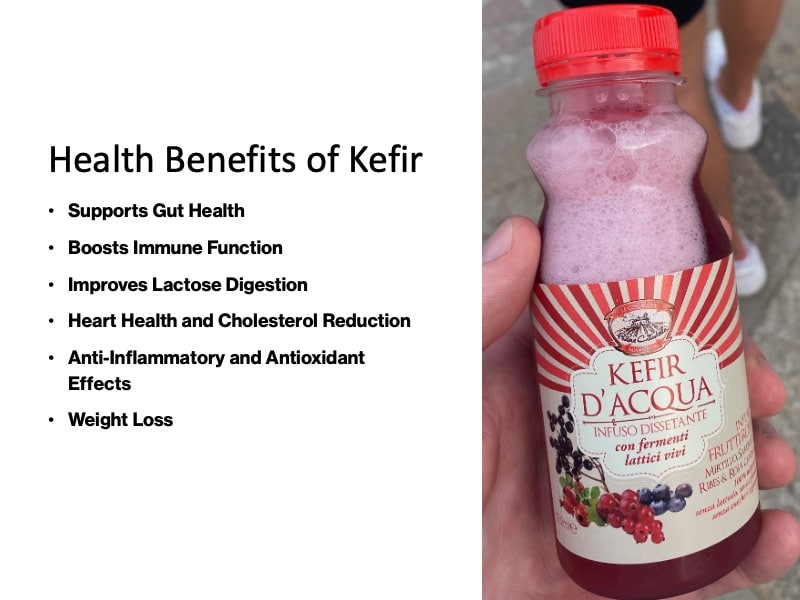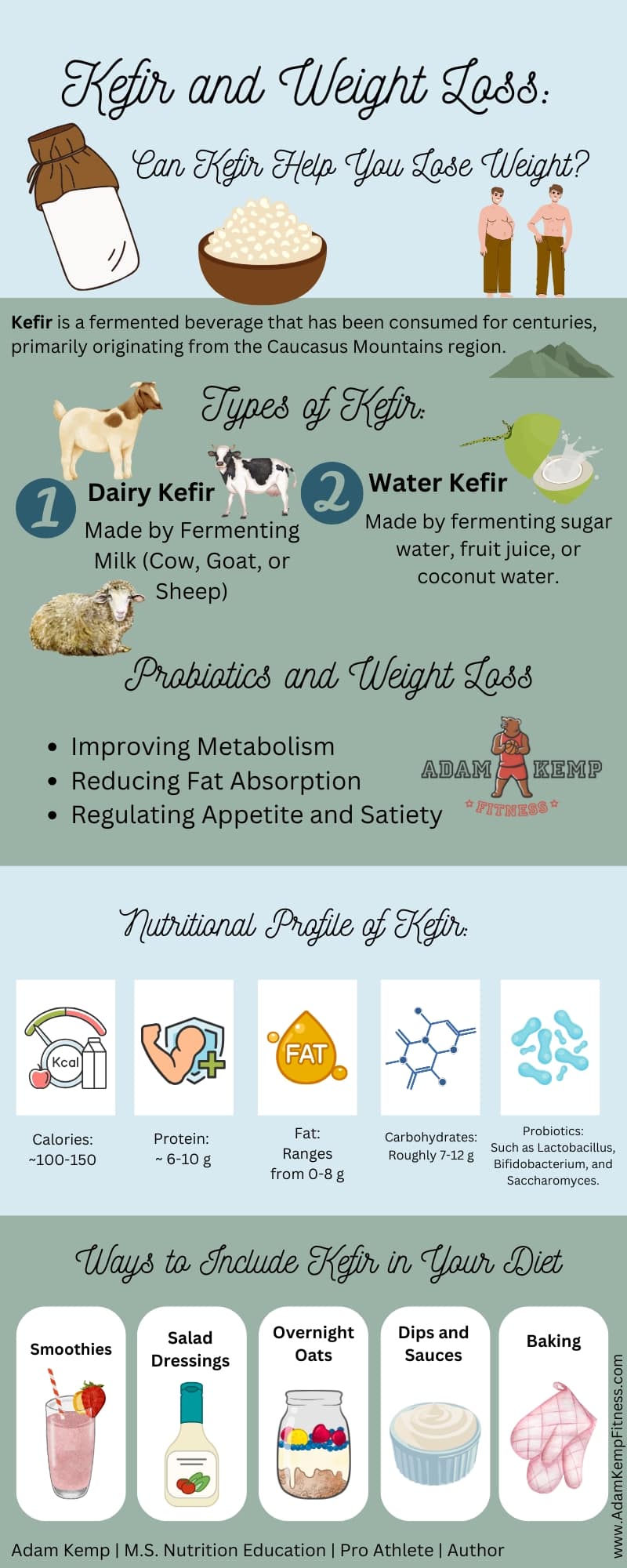Health Benefits of Kefir – Why is Kefir so Good for You?
Kefir is a fermented dairy drink packed with probiotics, essential nutrients, and powerful health benefits.
Originating from the Caucasus Mountains centuries ago, kefir has gained global recognition as a gut-friendly superfood that supports digestion, immunity, and overall well-being.
Whether you’re looking to improve gut health, explore new probiotic-rich foods, or even make kefir at home, this guide covers everything you need to know about this tangy, nutrient-dense beverage.
From its impressive health benefits to the best ways to enjoy it, discover why kefir is one of the most versatile and beneficial fermented foods available today.
What is Kefir?
Kefir is a fermented milk beverage rich in probiotics, originating from the Caucasus region.
It is made using kefir grains, which are symbiotic cultures of bacteria and yeast (SCBY).
The fermentation process results in a tangy, slightly effervescent drink with numerous gut health benefits.
Kefir is packed with essential nutrients, including protein, calcium, B vitamins, and beneficial probiotics that support digestion and immunity.
What Does Kefir Taste Like?
Kefir has a tangy, slightly sour taste similar to yogurt but with a thinner consistency.
Due to the fermentation process, it can also have a slight fizz, making it feel refreshing.
The taste varies depending on the milk used, fermentation time, and storage conditions.
How Much Kefir Should You Drink Per Day?
The ideal amount varies, but 1 cup (8 oz) per day is a good starting point.
For digestive health benefits, you can gradually increase to 2 cups per day.
However, drinking too much too quickly can cause mild bloating or digestive discomfort due to the high probiotic content.
Dangers of Kefir – Are There Any Side Effects of Kefir?
Kefir is generally safe for most people, but potential side effects include:
- Mild digestive upset (bloating, gas) when first introduced
- Allergic reactions for those with severe dairy allergies
- Interaction with medications (consult your doctor if you take immune-suppressing drugs)
Kefir vs. Yogurt: What’s the Difference?
Kefir contains a broader spectrum of probiotics compared to yogurt, making it more beneficial for gut health.
Here’s some more information on the differences between kefir and yogurt:
| Feature | Kefir | Yogurt |
|---|---|---|
| Probiotics | Contains 30+ strains | Contains 5-10 strains |
| Texture | Thin and drinkable | Thick and spoonable |
| Fermentation | 12-24 hours | 6-12 hours |
| Lactose Content | Lower (due to fermentation) | Moderate |
| Uses | Drinkable, smoothies, dressings | Eaten with a spoon, toppings |
Health Benefits of Kefir – Why Is Kefir Good for You?

Kefir is more than just a fermented dairy drink—it’s a nutritional powerhouse with a wide range of health benefits.
Packed with probiotics, essential vitamins, and bioactive compounds, kefir supports gut health, immune function, and digestion while also offering potential anti-inflammatory and heart-protective effects.
Amongst other benefits, research suggests that regular kefir consumption may help with lactose digestion, blood sugar control, and even mental well-being.
Whether you’re looking to improve digestion, boost immunity, or enhance overall wellness, kefir is one of the most effective and natural ways to nourish your body.
Supports Gut Health
Kefir is loaded with probiotics that help balance gut bacteria, improving digestion and reducing bloating.
Research suggests that Lactobacillus kefiranofaciens in kefir aids in irritable bowel syndrome (IBS) and inflammatory bowel disease (IBD) (Pereira et al., 2023).
Boosts Immune Function
The probiotics in kefir enhance immune system function by promoting the production of antibodies and anti-inflammatory cytokines.
Improves Lactose Digestion
Kefir contains beta-galactosidase, an enzyme that helps break down lactose, making it easier to digest for people with lactose intolerance (Rosa et al., 2017).
Heart Health and Cholesterol Reduction
Kefir has been linked to lower cholesterol levels and improved blood pressure regulation, likely due to the production of angiotensin-converting enzyme (ACE) inhibitors (Kairey et al., 2023).
Anti-Inflammatory and Antioxidant Effects
Kefir contains bioactive peptides that combat inflammation, oxidative stress, and cell damage, potentially reducing the risk of chronic diseases like cancer and diabetes.
Weight Loss

Kefir is good for weight loss as it boosts metabolism, improves digestion, and regulates appetite through its rich probiotic content.
It helps balance gut bacteria, which can enhance fat burning and reduce cravings.
Drinking kefir in the morning, post-workout, or as a snack can promote satiety and energy balance.
Choosing plain, unsweetened kefir with live probiotics maximizes its benefits without added sugars. When combined with a healthy diet and active lifestyle, kefir can be a powerful tool for sustainable weight management.
Is Kefir Lactose-Free? Does it Contain Lactose?
Kefir is not completely lactose-free, but the fermentation process significantly reduces lactose content, making it easier to digest for lactose-sensitive individuals.
For a fully lactose-free option, water kefir or coconut milk kefir are great alternatives.
Which Kefir Should You Buy?
Kefir is widely available in grocery stores, health food shops, and online retailers. However, I suggest you look for unsweetened and organic options to maximize health benefits.
Popular brands include:
- Lifeway Kefir (USA, UK, Canada)
- Evolve Kefir (USA)
- Bionova Kefir (Italy)
Lifeway Kefir is the best kefir in the United States, offering unmatched probiotic benefits, superior quality, and industry leadership since 1986.
It contains 12 live and active probiotic cultures, more than most brands, supporting gut health, digestion, and immunity.
Made with non-GMO, hormone-free milk, it’s packed with protein, calcium, vitamin D, and B vitamins, while being 99% lactose-free for easy digestion.
Lifeway leads the industry with innovative products like ProBugs for kids and Lifeway Oat for dairy-free consumers.
Committed to sustainability and philanthropy, Lifeway sources from local farms and reduces environmental impact.
With a smooth, tangy taste and varieties for every preference, it’s widely available in major grocery stores and online, making it the #1 kefir choice in the U.S.
Last update on 2025-07-04 / This article includes affiliate links/Images via Amazon Product Advertising API. I may earn commissions on purchases made through these links.
How to Make Kefir
Although you can buy kefir at many grocery stores, making kefir at home is simple and cost-effective. You only need two ingredients: kefir grains and milk (dairy or non-dairy).
Here’s how you can make it:
Ingredients:
- 1-2 tablespoons of kefir grains
- 2 cups of milk (cow’s milk, goat’s milk, or plant-based alternatives like coconut or almond milk)
Instructions:
- Place kefir grains in a glass jar.
- Pour milk over the grains, leaving some space at the top.
- Cover with a breathable cloth or coffee filter and secure with a rubber band.
- Let it ferment at room temperature (68-77°F) for 12-24 hours.
- Strain out the kefir grains using a plastic or non-metallic strainer.
- Store the strained kefir in the refrigerator and reuse the grains for your next batch.
Final Thoughts: Is Kefir Good for You?
Kefir is a nutrient-dense, probiotic-rich drink with a host of health benefits, from improved gut health to immune support.
Whether you make it at home or buy it at a store, kefir is a simple yet powerful addition to your daily diet.
For those who are lactose intolerant or prefer non-dairy options, water kefir and coconut kefir provide excellent alternatives.
With its impressive nutritional profile and versatility, kefir is undoubtedly one of the best fermented foods you can incorporate into your lifestyle.
This website does not provide medical advice. This website site does contain affiliate links, and purchases may earn a commission.
Read my Medical Disclaimer, Review Disclaimer, and Publishing Policies for more details. Use of this site indicates acceptance of these terms.




